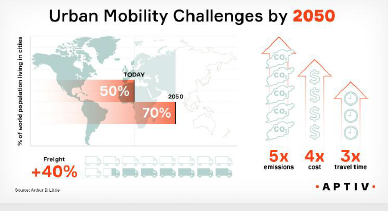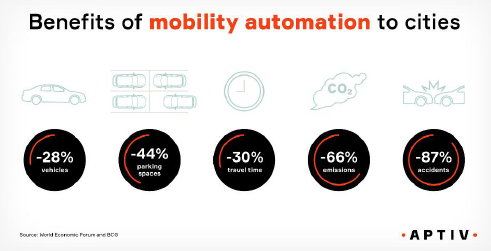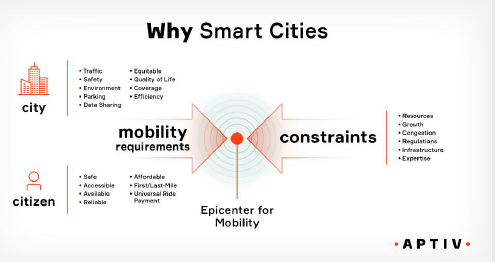Dr Ingo Stuermer, Global Engineering Director Autonomous Driving, Aptiv explores the extent to which autonomous vehicles can accelerate the journey towards smarter cities in the future
Cities are fast becoming the epicentre for mobility innovation – and for good reason. Mobility is the lifeblood of any city. It enables the movement of people,
goods and thus ideas, social interactions and resources. Mobility is what makes a city
liveable and an attractive place to live.

Cities today, however, face massive challenges in improving mobility. If you ask any city mayor, planner or transit official, he or she can reel off multiple challenges such as safety, congestion, environmental concerns and equitable access for all. With urban populations projected to increase to 70% of the global population by 2050 (up from about 50%
currently), these challenges will only continue to grow. This increased population growth in cities means that by 2050, congestion and thus commute times could increase threefold, costs of transportation could increase fourfold and emissions could rise to five times the current levels.
To ensure our cities continue to remain liveable, it is clear that a number of steps need to be taken to address these issues. These may involve empowering cities to come up with new solutions, offering financial support at a national level, or embracing new technologies
that are helping to evolve the very concept of mobility as we know it. It is the latter option that I would like to spend some time discussing in this piece – specifically, the pivotal role that autonomous vehicles can play in paving the way for a smarter, more connected city. Because, believe it or not, autonomous vehicle technology has an incredible potential to address most of these challenges.
Did you know, for example, that studies show autonomous technologies can reduce urban travel time and bring down emissions by 30% and 66% respectively? Or that autonomous technologies have the potential to lower the number of required parking spots by 44%?
While autonomous vehicles may still feel like a distant dream to many (unless you live in Las Vegas where they are already being used on the road today), they are a reality towards which we are rapidly moving. And one day in the not too distant future, they will play a very important role in helping to keep our cities moving.


Autonomous vehicles offer so much more than simply mobility benefits. Perhaps the most striking and valuable impact they can have on cities of the future concerns the safety of their residents. Autonomous technology has the potential to reduce traffic accidents by nearly 90%. That is a staggering figure that offers significant value to all cities across the globe. It is for this very reason that progressive cities are planning for connected and autonomous vehicles by deploying upgrades including vehicle-to-infrastructure technologies
and smart traffic signals, both of which can be helpful in enhancing road safety.
With urbanisation set to move into overdrive in the coming years, new technologies and new solutions will need to be deployed by city planners and councils in order to keep streets moving and the public safe. These are just a few of the reasons why autonomous stakeholders need to focus on working with cities to understand challenges, use cases and how autonomous technology can integrate and work with city requirements. The cities that handle these mobility challenges best will provide an enhanced quality of life and thus attract more residents, capital, jobs and opportunities. This is why it is critical that cities realign themselves with a mobility focus.
Dr Ingo Stuermer
Global Engineering Director Autonomous Driving
Aptiv
www.aptiv.com
www.twitter.com/aptiv





























